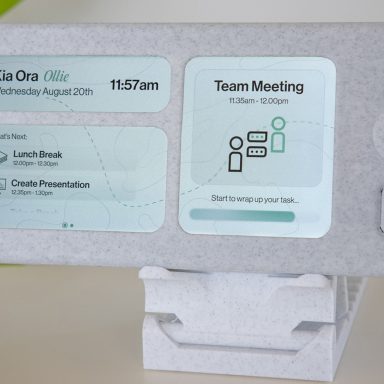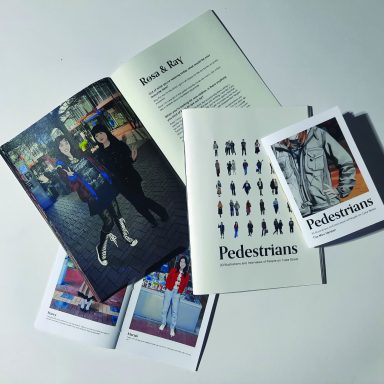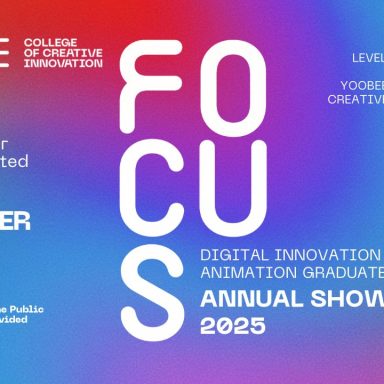From the Edges – Ashley Boyd, Media Design School; ‘Preparing creatives for self employment in the purpose economy’
In our ‘From The Edges’ series we feature Aotearoa NZ Academic Design Projects. Our practice as designers can be seen to be explored, pushed and perhaps become something entirely new where it exists at the edges of our practice in the world of academia. Free from the constraints of commercial outcomes and clients, designers explore and challenge existing paradigms.
In this article, we talk with Ashley Boyd about her Master’s project on ‘Preparing creatives for self employment in the purpose economy’.
In partnership with Media Design School

Talk to us about your background in design and the path you took to get where you are now?
I was lucky enough to study with the very first Bachelor of Media Design cohort at Media Design School ten years ago. I remember looking up to my tutors and thinking how cool it would be to one day be in their shoes mentoring designers. With a growing passion and understanding for socially good design, I spontaneously booked a one way ticket to Sydney after I graduated and quite literally walked straight off the plane, trained into the city and stepped into the office of a small charity I hoped to intern with for free. Luckily they were glad to see me! Despite the intention to come home within a few months, this was short lived after I fell in love with Australia and ended up growing my career there for the next five years, in-house at another charity and in an impact-driven brand storytelling agency.
It was at this point COVID hit, and hit hard. I was made redundant from my agency job, and had a worried family back home that I might get trapped in Australia without an income. I was on a plane home and had sold all my belongings within a few months. I have to commend the contribution and commitment my previous agency made to support me and my emergency freelance venture by being my first client.
What started out as a fall-back plan to find some freelance projects, surprisingly flourished into what seemed like a pretty reasonable career… and before I knew it I was off the job market and earning the same amount freelancing, if not more than my previous job, within the year. I have since niched into working solely with purpose-led and socially conscious businesses and can’t see myself ever going back to the 9-5 grind.
At the start of 2022, it seemed I had come full circle after Media Design School reached out asking if I’d be interested to lecture on the Bachelor of Media Design. I’ve spent my time since then working between teaching and freelancing in what feels like the perfect hybrid career for me. My instinct ten years ago was certainly true, that I’d find so much fulfilment out of mentoring young designers.
Can you give us some background on your current project?
I’m delighted to introduce this project to New Zealand’s freelance community. After extensive user research, study into learning experience design (LXD) and the purpose economy, I’m launching ‘The Freelance Project’ – a platform empowering Kiwi creatives to live and work with purpose through self-employment.
The platform provides support for existing and aspiring creative freelancers through community, advocacy and immersive learning experiences, with the first being Breakthrough Bootcamp – a barrier-breaking, self-discovery retreat for aspiring creative freelancers to tackle what’s holding them back from starting a freelance career. I believe the positive impact of the freelance economy in New Zealand is only just getting started, and through this initiative hope to support other creatives in building thriving businesses, and together advocate for our potential to generate economic, social & environmental value.

What were the catalysts or inspirations behind designing a learning experience that helps Kiwi creatives transition into freelancing?
I experienced the world of learning retreats for the first time by attending a web coding bootcamp in Bali with an incredible company called The Institute of Code. I was so enamoured with just how much was possible after delving into this environment with like-minded friends from across the globe, and encouragement of flow-state learning. Alongside my growing passion for teaching and mentorship, as well as the freelance lifestyle, I recognised just how many challenges freelancers face in their startup journey and the possibility of helping people through unique and focused learning experiences like a retreat.
Traditional box-ticking curriculums that revolve around a learning outcome don’t often work for everyone. Learning experience design puts the learner at the center, not the outcome, and considers the journey to learning just as important as the outcome. The more I discovered about the practice of LXD, the more I wanted to provide myself a space to design different types of learning experiences for creatives at different stages of the freelance journey.
Looking back now, I feel lucky to have had the pandemic to give me the boost I needed to finally start freelancing, after continuously thinking “maybe I’ll do it next year”. I may not have had the rallying support of ex colleagues and family to support me on that startup journey without it. But it made me question, what would it have taken for me to finally do it? Is there anything I can do to be the catalyst another creative may need?
While initially planning a retreat was my only goal, user research interviews opened me up to a range of issues that I felt could be solved with one cohesive voice, to act as a home and foundation for New Zealand’s freelance community.
What has been the most challenging part of your research so far, and how have you overcome this?
The most challenging part of this project was putting aside my dream idea, to remain open-minded to new routes and conduct genuine user research to hear out their problems – particularly as I am my own target audience and come with my own very deep perspective of what freelancers want and need.
A huge piece of the puzzle was how much I cared about creating something that personally fulfilled me, that I could see myself launching into the world and committing to as a future business. The last thing I wanted was to go down a new direction based completely on others’ needs and not consider my own.
To overcome this, I implemented a design methodology called ‘design feeling’. I proposed this methodology as an extension to human-centred design in a previous post-graduate paper, as a way to embrace everything human-centred design has to offer while also including the designer themselves as a key ‘human at the center’. This way, the project still served user needs but never lost sight of what I wanted out of it. If you want to know more about design feeling I’m more than happy to chat about it!

Why did you choose Media Design School to complete your Masters?
Media Design School is known for its industry focused approach to learning, and I can safely say I was not disappointed with the connections and relationships I was able to make through this experience. As an ex student and current lecturer, it’s pretty clear I’m an advocate for the school! But it is of course for good reason. The location and new campus is fantastic, the lecturers are supportive, and compared to bigger universities have the opportunity to spend more dedicated time with students. Prior to coming on board the Masters I spent a lot of time working out exactly what the briefs would entail, what I would get out of it, and how much flexibility I would have to do work that I was passionate about. It ended up being a massive tick from me as I completely tailored each brief to a passion project of mine, and am finishing with real industry connections, and a real business I plan to launch.

How has pursuing a postgraduate degree impacted your own design practice?
I have always had a strong opinion about the importance of doing work that gives you purpose and fulfilment, whether you’re in the creative industry or not. It should be a fundamental right for everyone to make the most of the one life they get to live (hint, hint: we spend most of our lives working). So furthering my design practice has always been with a focus on what I can do to feel more fulfilled at work. The degree has impacted the growth of my design practice in this way by allowing me accountability to see through personal projects, and develop my dream startup. It gave me the tools to hone in on my freelance business and launch a full rebrand, as well as articulate a practical method of ensuring this dedication to personal fulfilment in all my future projects.
What are your plans for this project once you finish your Master’s degree?
The Freelance Project is only just getting started, friends! I am looking forward to taking the next steps to bring this initiative to life, and would love to make new connections with people who are on board and willing to support in any way. So if you’re a self-employed creative, or interested in becoming one, do keep your eyes peeled.
I would love to connect on LinkedIn if you want to stay up-to-date with my work. Feel free to introduce yourself: https://www.linkedin.com/in/ashleyboyd93
You can also check out my freelance website and portfolio at www.consciously.co.nz
Be a DA Partner School.
Gain exposure of your school, students and teachers to the professional community & potential students.
Have an active engagement with the professional community and a relationship that shows your love and support of Aotearoa NZ design.




